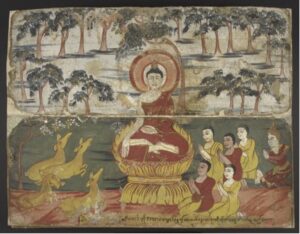“Who is the Buddha?” – new webinar series for teachers, Jan-March 2022
 In this series of webinars we explore some key aspects of Buddhism through the figure of the Buddha. Who was the Buddha? A philosopher or a divine saviour? A unique figure, or an example of a goal available to all Buddhists? How does his person relate to his teachings and to Buddhist beliefs and practices? And what is his role in our own UK context?
In this series of webinars we explore some key aspects of Buddhism through the figure of the Buddha. Who was the Buddha? A philosopher or a divine saviour? A unique figure, or an example of a goal available to all Buddhists? How does his person relate to his teachings and to Buddhist beliefs and practices? And what is his role in our own UK context?
Join scholars Dr Naomi Appleton (University of Edinburgh) and Dr Chris Jones (University of Cambridge) for an informative and entertaining tour through Buddhist literature, ideas, and practices, and gain access to some new resources for teaching Buddhism in your own classroom. This series is free to attend (registration required via EventBrite link here) and is suitable for new and experienced teachers of Buddhism alike, though those new to Buddhism should make sure to attend the first two sessions.
All sessions will run on Thursdays 4.00-5.15pm (UK time) on Zoom, with a presentation and then Q&A. The presentations will be recorded (without the Q&A) and made available on a variety of platforms including this blog after the event, along with the powerpoint slides and notes for personal use.
- The Buddha: Historical Figure or Literary Character? 27/1/2022
In this opening session we explore some of the stories told about the Buddha’s life, and how they relate to both Buddhist teachings and evidence about the Buddha’s time. We learn about his quest and his teaching career, and the importance he holds for the Buddhist community.
- The Buddha as Philosopher 03/2/2022
The Buddha is often presented as a great philosopher who understood the human condition and offered philosophical solutions to it. In this session we explore fundamental teachings ascribed to the Buddha and the assumptions that underpin them. What sort of problems did the Buddha seek to solve, and did he use philosophical approaches to solve them?
- The Buddha as Social Reformer 17/2/2022
There is a long tradition of conceptualizing the Buddha as a critic of social conventions who engaged productively with kings. Certainly “engaged Buddhist” movements emphasise the need to work within the world to alleviate suffering, distinct from pursuit of one’s own personal salvation. We look at how Buddhist literature presents the Buddha’s dealings with society and politics, and the continuing history of Buddhism’s relationship to worldly power.
- The Buddha in Buddhist Practice 24/2/2022
What is the role of the Buddha in the practices of Buddhists? Many Buddhists have images of the Buddha in their homes or temples, or visit places associated with his life. Pilgrimage sites boast enshrined relics of the Buddha, maintaining his bodily presence in the world. Buddhist traditions of meditation focus on visualising the Buddha’s qualities, or even oneself as a buddha now. In this session we explore some practices with the Buddha at their heart, and shed light on the Buddha as somewhere between teacher, saviour, deity, and idealised state.
- The Buddha among Buddhas 10/3/2022
The person we refer to as “the Buddha” has always been understood as one of many. The term “buddha” means “awakened one” and can be applied to other great teachers in past and future times, as well as – in some Buddhist traditions – to similarly illustrious figures in worlds other than our own. Some Buddhist traditions aim at audiences becoming buddhas themselves. So what does it mean to be a buddha, and are they all the same?
- The Buddha in Modern Britain 17/3/2022
The Buddha is very visible in modern Britain, both in forms of Buddhism that have taken root here, and as a “brand” appropriated by western consumers. In the latter role he appears in everything from garden ornaments to yoga studios, from T-shirt slogans to mindfulness colouring books. How did the Buddha become known to UK audiences? What does he mean in the UK marketplace, and how do Buddhists feel about it? In this final session we explore the Buddha’s journey to the West, and the diverse ways in which we might encounter him.
This series is supported by The Arts and Humanities Research Council.




